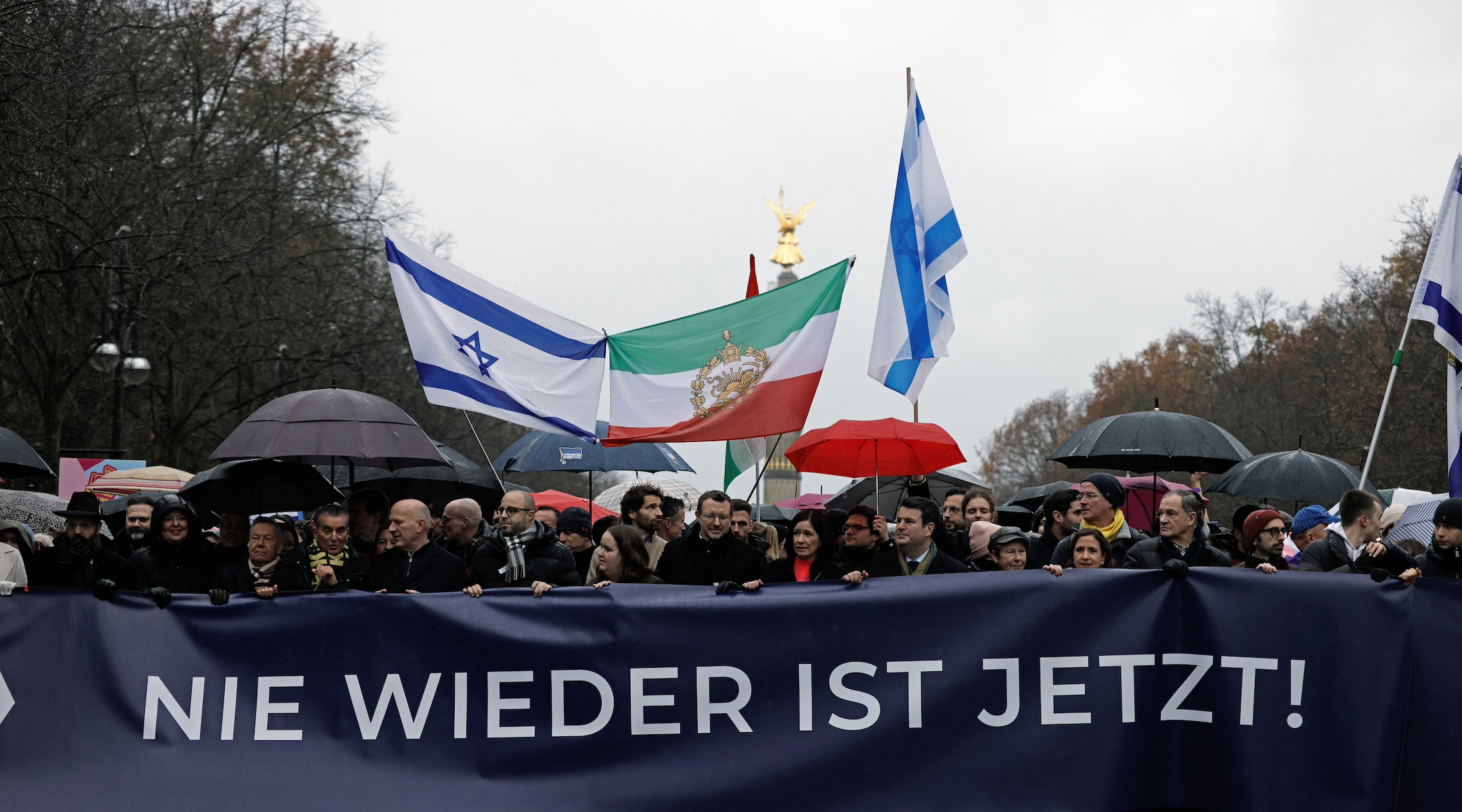Thousands of Jews and non-Jews rally against antisemitism in Berlin
“We as a population have to show, especially here in Berlin, that we are on Israel’s side,” said one non-Jewish Berliner

A banner reads “Never again is now!” at a pro-Israel rally in Berlin, Dec. 10, 2023. (Carsten Koall/picture alliance via Getty Images)
BERLIN (JTA) – Several thousand Berliners braved a chilling rain Sunday to demonstrate against antisemitism at an interfaith rally at the city’s iconic Brandenburg Gate.
The event — which drew a broad coalition of politicians and religious leaders as well as popular stars — was a response to a record increase in reported antisemitic incidents across Germany in the month after Hamas attacked Israel on Oct. 7.
Dubbed “Never again is now — Germany stands up,” the rally was organized by a Jewish real estate magnate, Nicolai Schwarzer.
In announcing the event, Schwarzer, 48, said he wanted “to send a powerful and unmistakable signal to the world — from the heart of the capital — that no form of antisemitism, hatred or xenophobia will be tolerated in Berlin or anywhere else in Germany.”
The rally joins several others organized in major cities in Europe and the United States to demonstrate opposition to antisemitism. They have been organized in part as a counterpoint to the large pro-Palestinian rallies that have taken place in many of those cities. Such rallies have been relatively muted and heavily monitored by police in Germany, where antisemitic speech and criticism of Israel are circumscribed by laws enacted in part because of the country’s role in perpetrating the Holocaust. Still, pro-Palestinian sentiment, including among Germany’s large immigrant population, is high.
“Sometimes I don’t recognize this country, something has gone out of control,” Josef Schuster, head of the Central Council of Jews in Germany, said at the rally.
He described a pro-Hamas protest that took place at Berlin’s University of the Arts on Nov. 13, where he said participants “dressed in black to look like Hamas terrorists. They had painted their hands red — a clear reference to the murder of two Israeli soldiers by an Islamist mob in Gaza more than 20 years ago. The whole thing was orchestrated by visiting professors from the global south – how can that be?” Schuster said the incident was proof of the danger of the movement to boycott Israel, which has been considered officially antisemitic in Germany since 2018.
Bärbel Bas, the president of Germany’s parliament, read through a litany of antisemitic incidents: “Swastikas and Stars of David have been daubed on synagogues, memorials and even private homes.” In one notable incident on Oct. 18, two Molotov cocktails were thrown at a Jewish community center that houses a synagogue as well as a kindergarten.
Bas described hearing from a student who was the only child to attend class at her Jewish school on a day when fear reigned about a Hamas call for violence abroad.
“Jews are afraid, and they feel left alone. And it’s not only hate that creates this feeling, but also silence and indifference,” she said. “And that’s why it’s important that we make a powerful, wipeable and loud statement here today. Never again is now.”
Other speakers included Israel’s ambassador to Germany, Ron Prosor; Berlin’s mayor, Kai Wegner; author Michel Friedman; 1990s pop music icon Herbert Grönemeyer; and Hubertus Heil, Germany’s minister of labor and social affairs.
The rally began with the lighting of a Hanukkah menorah by Rabbi Yehudah Teichtal, the head of Berlin’s chapter of the Chabad-Lubavitch movement. Representatives of Catholic and Protestant churches lit advent candles.
Eren Güvercin, a member of the German Islam Conference — which the German government started as a forum for dialogue in 2006 — delivered a prayer of his own, for “peace for the souls” of the Israelis murdered on Oct. 7 and for the hostages and their families, “who fear for their loved ones.”
“And we pray for peace for the people who are now suffering the consequences of this terrorist organization’s crimes in Gaza,” he added. “Nothing we say here today will solve the Middle East conflict. But we raise our voices to remind everyone who lives together here in this city, in this country: Faith is a source from which we draw to create peace. Faith must not divide us. It must unite us.”
Organizers claimed 11,000 people had taken part in the rally, though police estimated the attendance at 3,000. Those gathered were praised by many speakers for braving the weather to show their support. They included members of Berlin’s Jewish community, estimated at over 30,000, as well as non-Jewish allies.
“This is the third time we have been here in front of the Brandenburg Gate since Oct. 7,” said Berliner Melanie Schmergal, 55. “It upsets me that you don’t see any big demonstrations for Israel’s right to exist and against antisemitism. You see other people screaming quite a bit. [But] I believe… that the others are not in the majority.”
“It is important to take a stand against any kind of extremism,” said Christian Götz, 60. “And that Israel has a right to defend itself, and that we as a population have to show, especially here in Berlin, that we are on Israel’s side.”
The pair, who are not Jewish, said they had met the descendants of Jews who used to live in their building in Berlin, and who were either deported or managed to flee Nazi Germany.
“It’s so incredible that something like this seems possible again,” Schmergal said.
This article originally appeared on JTA.org.














